Stopping Keystone XL Isn't Just Smart, It's Important
Below is an editorial comment from Hill Heat editor Brad Johnson, a new feature. In addition to occasional commentary from leading climate voices, Hill Heat will continue its aggressive and accurate reporting on climate politics and policy.
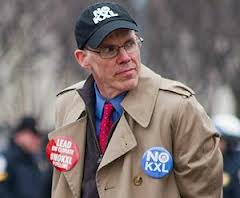 I just read Ryan Cooper’s excellent post on Bill McKibben, 350, and the climate movement. His rejoinder to Jonathan Chait’s misguided screed was spot on and well needed. As someone who has engaged in the professions of blogging and organizing, I have to say Ryan hit the nail on the head on how much harder it is — or at least how much a different set of skills is required — to help build a movement than it is to be a pundit:
I just read Ryan Cooper’s excellent post on Bill McKibben, 350, and the climate movement. His rejoinder to Jonathan Chait’s misguided screed was spot on and well needed. As someone who has engaged in the professions of blogging and organizing, I have to say Ryan hit the nail on the head on how much harder it is — or at least how much a different set of skills is required — to help build a movement than it is to be a pundit:
Organizing a mass movement is hard. I’ve done a bit of organizing myself—I started a chapter of Students for Sensible Drug Policy in college, and I was extraordinarily terrible at it. Like many pundits (not necessarily Chait), I’m cynical, easily discouraged, lazy, and most importantly, an absolutely atrocious leader. By contrast, sitting in my chair writing blog posts, while not exactly easy, is compelling and interesting and satisfying in a way that makes it no problem to sit and work for hours.There’s one dissonant note in Ryan’s piece. At one point, he fell into a classic pundit trap: he qualified his defense of the Keystone XL opposition with this “expert” criticism:
Second, Chait is indeed correct that new EPA regulations which phase out coal-fired power plants would have a much larger impact on carbon dioxide emissions than stopping Keystone XL.
Despite the conventional wisdom, a little investigation finds that this claim doesn’t hold water.
According to the Environmental Protection Agency’s own regulatory filing for the proposed new-plant CO2 standards, “the EPA projects that this proposed rule will result in negligible CO2 emission changes, quantified benefits, and costs by 2022.”
The EPA’s new regulations aren’t expected to have any significant impact on CO2 pollution because new coal plants aren’t economically competitive with other forms of electricity generation (or efficiency efforts) in the United States. By contrast, the Obama administration’s long-delayed limits on traditional pollutants will have a much greater impact on the nation’s coal fleet. The importance of the new-plant CO2 regulations is largely symbolic — an initial stake in the ground that greenhouse gases are pollution that needs to be regulated.
Whereas the EPA CO2 regulations are expected to have a negligible impact, the Keystone XL pipeline, if constructed, will have an annual carbon footprint of 120-200 million tons of CO2 from operating plus its tar-sands crude output. Thus, the pipeline’s impact would be equivalent to the ten biggest existing coal-fired power plants in the US (179 million tons of CO2 per year), or the equivalent of about 40 average US coal plants.
So Ryan is right that mobilizing to stop Keystone XL makes sense politically. It also makes sense policywise.
Update: Ryan Cooper responds on Twitter: “I agree that KXL is worth stopping, but in there I meant to refer to potential regulations that would apply to existing plants.”
The Obama administration has just held a series of “public listening sessions” about possible regulation of existing power plants, but has made no proposals.
Google-Funded Organizations Join Kochs To Call for Wind Production Tax Credit to Expire
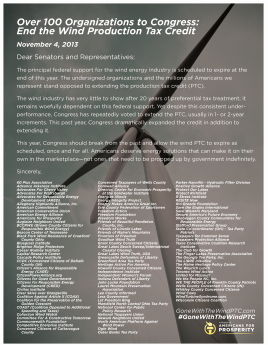 Several organizations sponsored by Internet giant Google are calling on Congress to let the wind production tax credit to expire. A full-page advertisement from the Koch brothers organization Americans for Prosperity states that the “undersigned organizations and the millions of Americans we represent stand opposed to extending the production tax credit (PTC)” because the “wind industry has very little to show after 20 years of preferential tax treatment.”
Several organizations sponsored by Internet giant Google are calling on Congress to let the wind production tax credit to expire. A full-page advertisement from the Koch brothers organization Americans for Prosperity states that the “undersigned organizations and the millions of Americans we represent stand opposed to extending the production tax credit (PTC)” because the “wind industry has very little to show after 20 years of preferential tax treatment.”
“Americans deserve energy solutions that can make it on their own in the marketplace — not ones that need to be propped up by government indefinitely,” the letter concludes.
Signatories of the letter who are Google-sponsored organizations, according to Google’s public policy transparency page, include:- American Conservative Union
- Competitive Enterprise Institute
- Heritage Action For America
- National Taxpayers Union
- R Street Institute
Google’s public policy division, which chose to sponsor the above groups, is run by former Republican Congresswoman Susan Molinari.
In addition to Americans for Prosperity, other signatories notorious for promoting climate-change denial and attacks on climate scientists include the Committee for a Constructive Tomorrow (CFACT), Cornwall Alliance, Freedom Works, Independent Women’s Forum, Club for Growth, and the American Energy Alliance.
The listed organizations are not the only Google-supported opponents of wind power. This year, Google joined the American Legislative Exchange Council (ALEC), whose energy agenda is driven by Koch Industries and other fossil-fuel companies. ALEC’s vigorous campaign against state-level renewable energy standards led to the resignation of the American Wind Energy Association and the Solar Energy Industries Association, who had been members in ALEC until this year. Google only updated its public policy transparency page to include its membership in ALEC recently, months after the first reports in August of its membership.
Google is a major beneficiary of the wind PTC, as the company has the stated goal of “100% renewable energy” power for its operations, which include energy-intensive data centers across the nation. Google currently is the sole customer of the entire output of three different wind farms — NextEra’s 114-megawatt Story County II wind farm in Iowa, NextEra’s 100.8MW Minco II wind farm in Oklahoma, and Chermac Energy’s planned 239.2 MW Happy Hereford wind farm in Amarillo, Tex. Breaking Energy’s Glenn Schleede has estimated that Google will receive a $370 to $417 million benefit from the PTC over ten years if it is continued.
If the PTC expires, Google shareholders will suffer, as will the nation’s growing wind industry. Moreover, the effort to meet the challenge of eliminating greenhouse pollution will be stalled, as the fossil-fuel industry enjoys the benefits of not having to pay for the costs of its civilization-threatening pollution. Climate and corporate accountability groups Forecast the Facts and SumOfUs have called on Google to end its support for politicians and groups that reject the threat of climate change and oppose clean-energy policy.
Google has not responded to requests for comment.
Update: The fossil-fuel industry group American Energy Alliance’s Press Secretary Chris Warren has notified Hill Heat of an error in the originally published letter. The original list included “Parker Hannifin – Hydraulic Filter Division” in the list of supporting organizations. The corrected letter replaces that group with the “Interstate Informed Citizens Coalition.”
CNBC Host Joe Kernen Mocks Climate Investments on Sandy Anniversary
CNBC host Joe Kernen marked the one-year anniversary of Superstorm Sandy by questioning the wisdom of investing to protect utility customers from extreme weather. In an interview with Steve Holliday, the CEO of utility company National Grid, Kernen cited Bjorn Lomborg’s recent global warming denial op-ed in the Washington Post, “Don’t Blame Climate Change for Extreme Weather.”
Kernen’s repeated dismissal of global warming and attacks on climate scientists and activists as the “eco-taliban” have spurred a 45,000-signature petition drive organized by climate accountability group Forecast the Facts.
Reading from Lomborg’s op-ed, Kernen rebuked Holliday for investing in resilience to damages from extreme weather, which have been rapidly rising. In particular, both extreme precipitation and sea level are increasing in the Northeast, both due to fossil-fueled global warming.
Kernen claimed that his dismissal of the well-known connection between global warming and extreme weather was backed by prominent climate scientist Gavin Schmidt, of NASA’s Goddard Institute for Space Studies.
Hill Heat contacted Dr. Schmidt about Kernen’s use of his words, which he called a “red herring.”
“My statement in no way implies that no extremes are changing,” Dr. Schmidt retorted, “and certainly not that electricity companies shouldn’t invest in increased resilience, which, as Holliday rightly notes, is prudent regardless.”
How did Kernen’s confabulation come to pass?
About a month ago, E&E News interviewed Dr. Schmidt about a paper that found that increases in weather extremes are concentrated in North America and Europe:The study noted that the greatest recent year-to-year changes have occurred in much of North America and Europe, something confirmed by a separate study last year. The result, according to several scientists, is a misperception across the West that the weather extremes occurring there are occurring everywhere. . . . “General statements about extremes are almost nowhere to be found in the literature but seem to abound in the popular media,” Schmidt said. “It’s this popular perception that global warming means all extremes have to increase all the time, even though if anyone thinks about that for 10 seconds they realize that’s nonsense.”Lomborg then misleadingly contrasted Dr. Schmidt’s quotation with comments from President Obama:
President Obama has explicitly linked a warming climate to “more extreme droughts, floods, wildfires and hurricanes.” The White House warned this summer of “increasingly frequent and severe extreme weather events that come with climate change.” Yet this is not supported by science. “General statements about extremes are almost nowhere to be found in the literature but seem to abound in the popular media,” climate scientist Gavin Schmidt of the NASA Goddard Institute for Space Studies said last month. “It’s this popular perception that global warming means all extremes have to increase all the time, even though if anyone thinks about that for 10 seconds they realize that’s nonsense.”Kernen then used Lomborg’s article to argue that climate change has no influence on extreme weather:
I’m looking at a Washington Post piece, Steve. It’s the Washington Post. “Don’t blame climate change for extreme weather.” It goes on to say that in popular — um — well, you see that is in the popular media, but the science does not support it at all. . . . Gavin Schmidt of NASA Goddard Institute: “General statements about extremes are almost nowhere to be found in actual scientific literature but abound in popular media. It’s a popular perception that global warming means that all extremes have increased although anyone who thinks about that for ten seconds realizes is nonsense.”
Kernen’s comments ironically appeared with the chyron “SUPERSTORM SANDY: LESSONS LEARNED.”
Transcript:
Bracken Hendricks: The Climate Movement Must 'Demand a Vision of a Future We Want to Live In'
At a Sandy anniversary panel organized by Forecast the Facts, Center for American Progress senior fellow Bracken Hendricks described how society needs to not only divest from climate-polluting fossil fuels but also invest in a sustainable, equitable future.
“The fight against the bad stuff and pulling that money back has to happen. I want to really drive home a second piece of this: We need to know what we want. Because it’s not enough to know what we don’t want. And we need to get very busy building it, and we need to demand it.”“Demand that people focus on the pain and demand that people focus on what we need instead.”
“We need to be smart enough and insistent enough to demand a vision of a future we want to live in. It’s not enough to oppose what we know is going to hurt us.”
“The anniversary of Sandy in lower Manhattan is really a time to look at Wall Street, and how we can come together as people and have our collective voice be strong enough to make a difference in the face of very large pools of capital that, without us, are going to make a very grave mistake.”
Bracken Hendricks (@HendricksB) is a Senior Fellow at the Center for American Progress and works at the interface of global warming solutions and economic development. Hendricks was an architect of clean-energy portions of the American Recovery and Reinvestment Act. He was founding executive director of the Apollo Alliance and has served as an energy and economic advisor to the AFL-CIO, Pennsylvania Governor Ed Rendell’s Energy Advisory Task Force, and numerous other federal, state, and local policymakers and elected officials.
The Forecast the Facts forum, “Turning the Tide: The Challenge And Promise Of Carbon Divestment for a Post-Sandy Wall Street,” took place on Sunday, October 29, at Cooper Union’s Rose Auditorium in New York City, with panelists from the Center for American Progress, Next Generation, and NYU Divest.
Strategist James Slezak: The Fossil-Fuel Industry Needs To Be Liquidated
At a Sandy anniversary panel organized by Forecast the Facts, climate and economic expert James Slezak says that investors should recognize that the fossil-fuel industry will go the way of the horse-and-buggy. Oil and coal companies, Dr. Slezak said, are “bad investments” that “don’t have the right capabilities or the right assets” to become renewable energy companies. Therefore, these companies should “liquidated” and their assets “wound up.”
One dangerous myth is that the BPs, the Exxons, the coal interests of the world are just energy companies and we just need to let them see why really, the future of energy is in renewables and they should be the renewable energy companies of the future. Don’t get me wrong, renewable energy is the future and needs to be quickly what replaces those companies. But I don’t think those companies are going to be the renewable energy companies of the future.When you look at what these companies actually do, with a business hat on, and say I’m going to place a bet on the future on who’s going to win the race — Take solar for example. It’s a high-tech semiconductor industry. It’s not what dudes with hard hats on in the middle of the North Sea are good at, and it’s not where you would expect money to go.
We have to be a little bit harder on them. And make it clear why they’re such bad investments. They’re not going to win the race to develop solar. They don’t have the right capabilities, the right assets. They need to be wound up. They need to be liquidated. Their assets need to be wound up.
That sounds like a crazy, radical point of view, but you can look at multiple industries that the market just naturally wound up. The horse and buggy. New York’s streets were first lit with whale oil. True fact. Look it up. No one lamented those industries going. The typewriter industry wasn’t the industry that became the computer industry. These guys are going to go. The sooner the better, I think. And we don’t want to give them an escape route.
James Slezak (@jslez) is a social entrepreneur, author, and co-founder of Peers.org, a member-driven organization to support the sharing economy. He was previously a founding executive team member and partner at Purpose.com, and consultant at McKinsey & Company, where he led projects on sustainability, technology and economic development. He is co-author of the book Climate Change and Australia, as well as public reports on the economics of carbon emissions reduction released by McKinsey. James holds a PhD in Physics and was an affiliate at Harvard’s Berkman Center for Internet and Society.
The Forecast the Facts forum, “Turning the Tide: The Challenge And Promise Of Carbon Divestment for a Post-Sandy Wall Street,” took place on Sunday, October 29, at Cooper Union’s Rose Auditorium in New York City, with panelists from the Center for American Progress, Next Generation, and NYU Divest.
Fox Business Marks Sandy Anniversary with Climate Denial
It is one year since Hurricane Sandy ravaged the east coast. The mainstream media continues to use the storm to push a global warming agenda.
Watch it:
Varney’s guest, the conservative Media Research Center’s Dan Gainor, complained that of the 32 segments in network news his group found that mentioned Sandy and global warming, only two questioned the overwhelming science that the increasing greenhouse effect from the combustion of fossil fuels is accelerating sea level rise and making weather more extreme and chaotic. Despite numerous scientific attribution studies on wildfires, heat waves, droughts, and storms that have found global warming fingerprints, Gainor falsely claimed that “we cannot link climate change or global warming to a specific event.” He furthermore dismissed the decades of work by thousands of scientists in all earth-science disciplines that provide our understanding of climate change as “stuff” and “guesswork.”
Gainor did not emphasize that his organization found only 32 mentions of climate change and Sandy in an entire year of network news coverage. (In contrast, for example, there were 52 segments on Iran’s nuclear program in five months of network news coverage from November 2011 to March 2012.)
Climate denial is rampant in the financial press, not just the media organs owned by Murdoch like Fox and the Wall Street Journal. Forbes regularly publishes climate-denial columns, and Reuters editors are openly hostile to climate science. And Comcast’s CNBC features hosts such as Joe Kernen, who argues that the findings of climate science are a plot concocted by a “bonafide cult” of “enviro-socialists” and the “eco-taliban.”
Varney and Gainor also bemoaned the public stand the Los Angeles Times has taken against global warming denial in its opinion pages. Over 25,000 people have signed a petition from climate accountability organization Forecast the Facts calling on the nation’s other major papers, including the New York Times, USA Today, and the Washington Post, to follow suit.
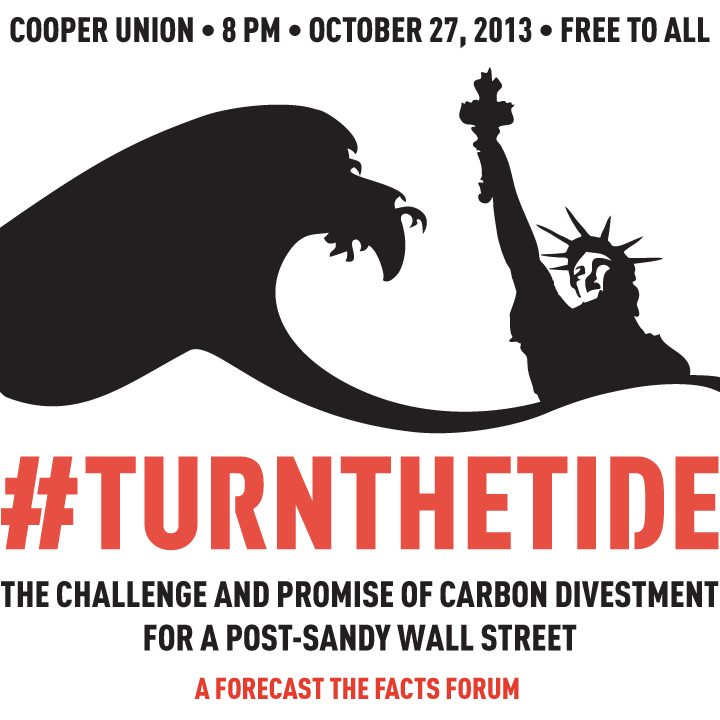 On Sunday, Forecast the Facts hosted a forum held in downtown New York City looking at the role of Wall Street in financing the climate change that threatens New York’s future prosperity. The panelists of the Turning the Tide forum, including Center for American Progress senior fellow Bracken Hendricks, Tom Steyer advisor Kate Gordon, and New Economy Lab’s James Slezak, discussed how the financial industry needs to reject the anti-scientific arguments pushed by Murdoch’s media properties and David H. Koch’s network of think tanks and advocacy groups.
On Sunday, Forecast the Facts hosted a forum held in downtown New York City looking at the role of Wall Street in financing the climate change that threatens New York’s future prosperity. The panelists of the Turning the Tide forum, including Center for American Progress senior fellow Bracken Hendricks, Tom Steyer advisor Kate Gordon, and New Economy Lab’s James Slezak, discussed how the financial industry needs to reject the anti-scientific arguments pushed by Murdoch’s media properties and David H. Koch’s network of think tanks and advocacy groups.
Gordon cited the Risky Business initative, led by Steyer, Michael Bloomberg, and former Treasury Secretary Hank Paulson. The initiative, Gordon explained, is meant not only to provide an economic assessment of the risk exposure different companies and industries have to manmade global warming, but also to change the culture of the financial sector. With that goal in mind, influential Republicans and conservatives who accept the basic science of climate change have been courted.
Wall Street is at a crossroads, all the panelists agreed. On the path of fossil-fuel companies and climate deniers like New York City’s richest man, carbon financier David H. Koch, lies accelerating sea level rise and intensifying storms that will swamp the islands of New York City. But the investors and analysts can choose another path, recognize the science, and invest in a sustainable future that will save their city.
Fox Business Network Transcript:
Google's Climate Scientists Criticize Latest Google-Funded Act Of Climate Denial, Featuring Heritage Foundation and Heartland Institute
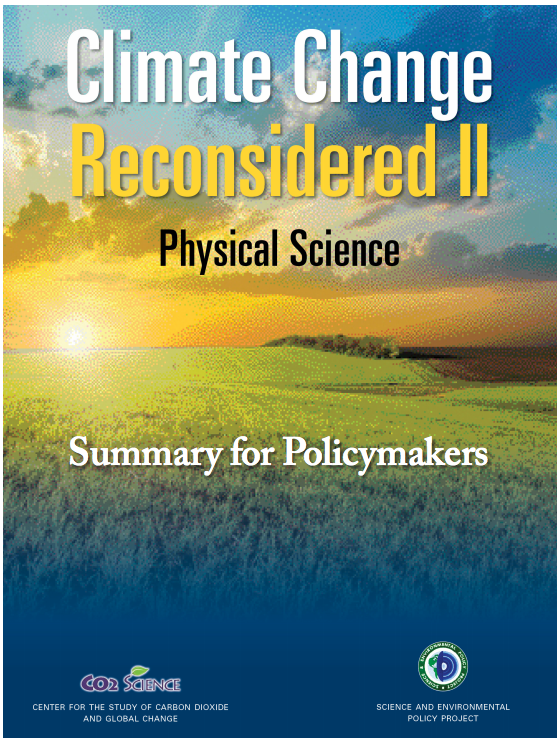
Heritage’s mock climate report, presented at the Google-funded Heritage Foundation.
Like the Heritage Foundation, the Heartland Institute, Soon, and Carter have significant funding from the fossil-fuel industry and a long record of questioning not only the economics of regulating climate pollution but the underlying science itself.
Greenpeace activists confronted Bast at Heritage after the event, asking him to reveal whether Chicago magnate Barre Seid funded the multimillion-dollar climate-denial initiative. Bast refused to answer the question.
Since Google’s selection of former Republican representative Susan Molinari as their chief lobbyist, the Internet giant has embraced key players in the climate-denial machine. In the last few months, Google was the top funder of the annual dinner of the Competitive Enterprise Institute, famed for its “CO2: We Call It Life” ads, held a fundraiser for the re-election of Sen. Jim Inhofe (R-Okla.), who penned the book “The Greatest Hoax,” and was revealed to be a member of the American Legislative Exchange Council, which has argued that “substantial global warming is likely to be of benefit to the United States.”
Google’s support of the Heritage Foundation elicited new criticism from climate scientists associated with the company.
“Their motto may be ‘don’t be evil,’ but they apparently don’t have any problem with giving it money,” climate scientist Andrew Dessler, Professor of Atmospheric Sciences at Texas A&M University, told Hill Heat in an e-mail interview.
“If you want to be a corporate leader on climate change or science education, you should fund groups to combat the anti-science garbage produced by Heritage, not the other way around,” said climate scientist Simon Donner, Associate Professor, Department of Geography, University of British Columbia, when asked for comment.
Dr. Dessler and Dr. Donner were Google Climate Science Communication Fellows in 2011. They and 15 other Fellows recently sent an open letter to the company criticizing its fundraiser for Sen. James Inhofe (R-Okla.), writing that “in the face of urgent threats like climate change, there are times where companies like Google must display moral leadership and carefully evaluate their political bedfellows.”
In a campaign led by climate accountability organization Forecast the Facts, over 150,000 people have signed petitions challenging Google’s support for climate deniers, and have staged protests in Washington DC, New York City, and Google’s headquarters in Mountain View, Calif.
Sen. Ed Markey (D-Mass.): "There Are No Emergency Rooms For Planets"
Newly elected Sen. Ed Markey (D-Mass.), in his first speech on the floor of the U.S. Senate on Wednesday, spoke on the urgency of fighting climate change pollution with new clean energy.
“We need to create an end of the era of climate denial. Climate change is irrefutable. It is raising sea levels. It is giving storms more power. The planet is running a fever. There are no emergency rooms for planets. We must put in place the preventative care of unleashing a renewable energy revolution in wind, in solar, in biomass, in geothermal, in energy efficiency that avoids the worst, most catastrophic impacts of climate change on this planet. We are seeing it on an ongoing basis, not just here, but across the planet.Video:Our moral duty to future generations calls on us to address climate change. But it also is an economic opportunity to create new jobs here in our country. I will soon introduce new legislation that will call on American to reach a 25 percent target for clean energy and energy efficiency improvements. This bill will create jobs as it cuts pollution. And I will continue to work to pass climate legislation as I did in the House of Representatives.”
As a member of the House of Representatives, Markey was a co-sponsor of climate legislation that passed the House in 2009 but died in the U.S. Senate.
From Hitler To Lobsters: Sen. Angus King (I-Maine) Decries 'Oblivious Generation' Ignoring Climate Threat
In an impassioned floor speech on Tuesday, freshman U.S. Senator Angus King (I-Maine) compared Churchill’s unheeded warnings about the threat of Hitler to America’s inaction on the global threat of climate change pollution. Sen. King also described how carbon dioxide has been rising since the start of the Industrial Revolution, how sea level rise threatens America’s coastal cities, and how Maine’s lobsters are threatened with extinction by global warming.
“I rise today, Madam President, because we are entering a period of consequences,” Sen. King said. “It’s 1936. It’s August of 2001, when we had warnings Al Qaeda determined to strike in the United States.”
Sen. King concluded, “The generation that finally woke up to World War II, and fought it, and preserved this country and the western civilization for us has often been referred to as the Greatest Generation. The reason they were the Greatest Generation is that they were willing to face a problem and make enormous sacrifices in order to deal with it, to protect us and our children and grandchildren and our ability to function in this new world. They were the Greatest Generation. I have to say, Madam President, if somebody was going to characterize us, we’d be characterized as the Oblivious Generation – the generation that saw the data, saw the facts, saw the freight train headed for us and said, ‘That’s okay, it’s business as usual. Don’t bother me, I don’t want to be inconvenienced.’”
Sen. King was governor of Maine from 1995 to 2003.
Transcript:
Microsoft Defends Its Support For Anti-Climate American Legislative Exchange Council
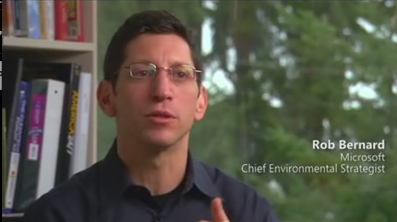 Microsoft is defending its membership in one of the country’s most notorious enemies of environmental protection, the American Legislative Exchange Council (ALEC). In an August blog post, Microsoft chief environmental strategist Rob Bernard acknowledged that his company is a member and supporter of ALEC, which has for decades promoted an agenda of climate change denial, attacks on renewable energy, and opposition to environmental protection on behalf of funders such as Koch Industries, Exxon Mobil, and other conservative fossil-fuel interests. ALEC is an alliance of corporations, conservative foundations, and Republican state legislators that promotes anti-regulatory and conservative legislation at the state level.
Microsoft is defending its membership in one of the country’s most notorious enemies of environmental protection, the American Legislative Exchange Council (ALEC). In an August blog post, Microsoft chief environmental strategist Rob Bernard acknowledged that his company is a member and supporter of ALEC, which has for decades promoted an agenda of climate change denial, attacks on renewable energy, and opposition to environmental protection on behalf of funders such as Koch Industries, Exxon Mobil, and other conservative fossil-fuel interests. ALEC is an alliance of corporations, conservative foundations, and Republican state legislators that promotes anti-regulatory and conservative legislation at the state level.
As you would expect, Microsoft works with a wide range of groups across the political spectrum addressing policy issues important to our business. We work with many of these groups on narrowly-tailored technology policy issues and not the full set of issues they address. Our engagement with a particular group is not an endorsement of all the policy positions those groups have taken. For instance, we’ve received some questions about model legislation developed by the American Legislative Exchange Council that would repeal renewable energy mandates at the state level. To clarify this issue, Microsoft participates in ALEC’s Communication and Technology Task Force, as do many leading companies in the technology sector. We do not participate in any other ALEC task forces or provide any support or funding for ALEC’s work on environmental issues or other issues outside of communication and technology policy. In short, ALEC is not speaking for us on renewable energy policy.
Microsoft is also a funder of the Heartland Institute, a long-time partner of ALEC in the promotion of climate change denial and attacks on the integrity of climate scientists.